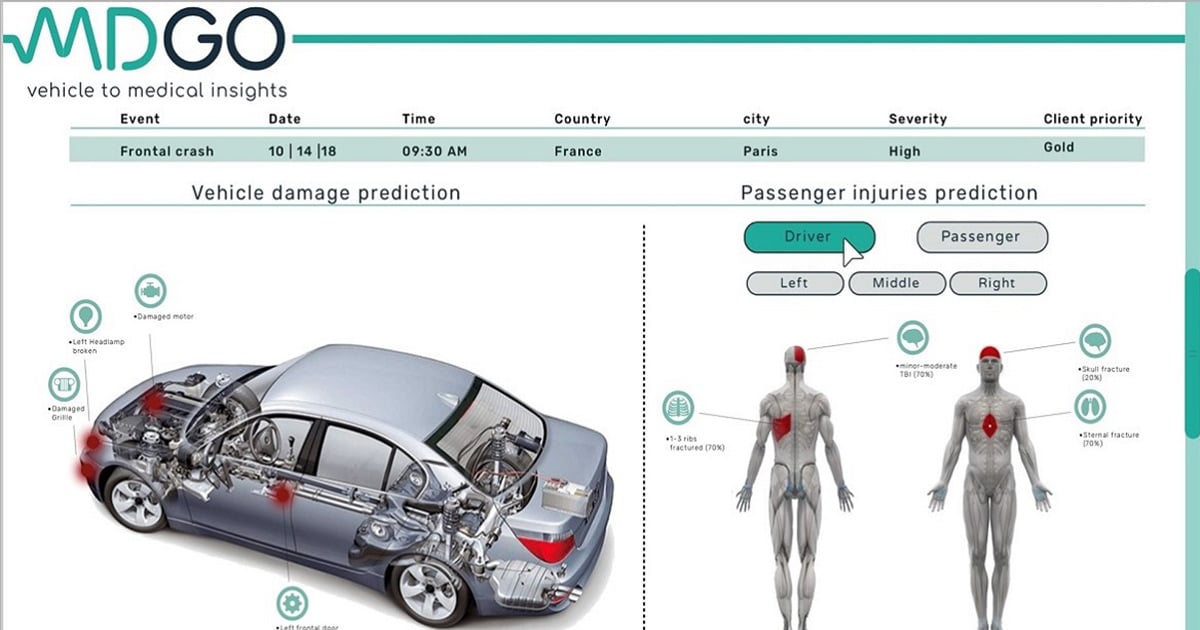Hyundai is partnering with MDGo, an Israeli start-up specializing in medical artificial intelligence (AI) systems, to help shape the next generation of advanced vehicle safety systems. Hyundai and MDGo will co-develop connected services that bring the worlds of health and automotive closer than ever. The initiative is a key part of Hyundai Motor’s philosophy of caring for its customers and also contributes towards its vision for ‘connected mobility’. MDGo’s intelligent injury analysis system uses an elaborate AI algorithm that measures the attributes applied to the passengers in real-time and alert emergency services and medical facilities to a driver’s likely injuries following a road traffic accident. Using the spectrum of sensors in the car and MDGo technology, Hyundai Motor will be able to send emergency services a wealth of data like injury level information and safety system activation. Crucially, the innovation will secure golden time (a period of time following a traumatic injury during which there is the highest likelihood that prompt medical and surgical treatment will prevent death) that enable emergency services to assess the required scale of response and deploy appropriately skilled medical personnel before arriving at the scene of an accident.
MDGo’s intelligent injury analysis system uses an elaborate AI algorithm that measures the attributes applied to the passengers in real-time and alert emergency services and medical facilities to a driver’s likely injuries following a road traffic accident. Using the spectrum of sensors in the car and MDGo technology, Hyundai Motor will be able to send emergency services a wealth of data like injury level information and safety system activation. Crucially, the innovation will secure golden time (a period of time following a traumatic injury during which there is the highest likelihood that prompt medical and surgical treatment will prevent death) that enable emergency services to assess the required scale of response and deploy appropriately skilled medical personnel before arriving at the scene of an accident. The MDGo AI technology interprets accident data and compiles numerous sets of insights regarding the occupants and the vehicle. Within seven seconds of impact, emergency services are sent a detailed analysis of potential injuries, communicated through medical terms. The AI system is continually learning and refining its interpretation of different accident scenarios. This process of iterative enhancement is facilitated by hospitals inputting real data on patients’ injuries, which the system compares to its prediction to further refine its analysis.
The MDGo AI technology interprets accident data and compiles numerous sets of insights regarding the occupants and the vehicle. Within seven seconds of impact, emergency services are sent a detailed analysis of potential injuries, communicated through medical terms. The AI system is continually learning and refining its interpretation of different accident scenarios. This process of iterative enhancement is facilitated by hospitals inputting real data on patients’ injuries, which the system compares to its prediction to further refine its analysis.
 MDGo’s intelligent injury analysis system uses an elaborate AI algorithm that measures the attributes applied to the passengers in real-time and alert emergency services and medical facilities to a driver’s likely injuries following a road traffic accident. Using the spectrum of sensors in the car and MDGo technology, Hyundai Motor will be able to send emergency services a wealth of data like injury level information and safety system activation. Crucially, the innovation will secure golden time (a period of time following a traumatic injury during which there is the highest likelihood that prompt medical and surgical treatment will prevent death) that enable emergency services to assess the required scale of response and deploy appropriately skilled medical personnel before arriving at the scene of an accident.
MDGo’s intelligent injury analysis system uses an elaborate AI algorithm that measures the attributes applied to the passengers in real-time and alert emergency services and medical facilities to a driver’s likely injuries following a road traffic accident. Using the spectrum of sensors in the car and MDGo technology, Hyundai Motor will be able to send emergency services a wealth of data like injury level information and safety system activation. Crucially, the innovation will secure golden time (a period of time following a traumatic injury during which there is the highest likelihood that prompt medical and surgical treatment will prevent death) that enable emergency services to assess the required scale of response and deploy appropriately skilled medical personnel before arriving at the scene of an accident. The MDGo AI technology interprets accident data and compiles numerous sets of insights regarding the occupants and the vehicle. Within seven seconds of impact, emergency services are sent a detailed analysis of potential injuries, communicated through medical terms. The AI system is continually learning and refining its interpretation of different accident scenarios. This process of iterative enhancement is facilitated by hospitals inputting real data on patients’ injuries, which the system compares to its prediction to further refine its analysis.
The MDGo AI technology interprets accident data and compiles numerous sets of insights regarding the occupants and the vehicle. Within seven seconds of impact, emergency services are sent a detailed analysis of potential injuries, communicated through medical terms. The AI system is continually learning and refining its interpretation of different accident scenarios. This process of iterative enhancement is facilitated by hospitals inputting real data on patients’ injuries, which the system compares to its prediction to further refine its analysis.“MDGo possesses exceptional AI analysis technology optimized for driver safety.Through this technology, we expect a significant improvement in the emergency medical services of vehicles in the short-term while our long-term goal is to provide innovations in passenger experience of vehicle safety utilizing new technology that enable real-time physical monitoring.” - Youngcho Chi, President and Chief Innovation Officer at Hyundai Motor Group.The new partnership will also help Hyundai to enhance the active and passive safety capabilities of its vehicles. Big data gathered from the detailed, intelligent analysis of multiple accident scenarios will inform Hyundai of how to bolster crash structures and integrate new technologies to overcome issues identified by the AI analysis.Hyundai Motor’s vision of ‘freedom of mobility’ encompasses limiting accidents and their impact on customers. When paired with the company’s exploration of ‘connected mobility’ through connected vehicles, this innovation looks set to deliver a major leap forward in driver safety.This latest customer-focused development follows other medical-related announcements by Hyundai Motor, such as the development and future commercialization of the world’s first multi-collision airbag system, plus an innovative technology that assists hearing-impaired drivers. The company presented another innovation at CES 2019 – a future-focused first-responder vehicle named ‘Elevate’. This ‘Ultimate Mobility Vehicle’ was developed to be the first-ever vehicle with moveable legs, enabling emergency services to cross hazardous terrain to reach victims of natural disasters.Additionally, last year, Hyundai demonstrated another medical innovation in Korea, using its NEXO fuel cell vehicle. While traveling autonomously, the vehicle communicated with physicians, sharing a passenger’s medical information in real-time, including blood pressure and heartbeat data.
Published Date: 2019-06-12 16:00:40
Post Comments
Most Loved News









